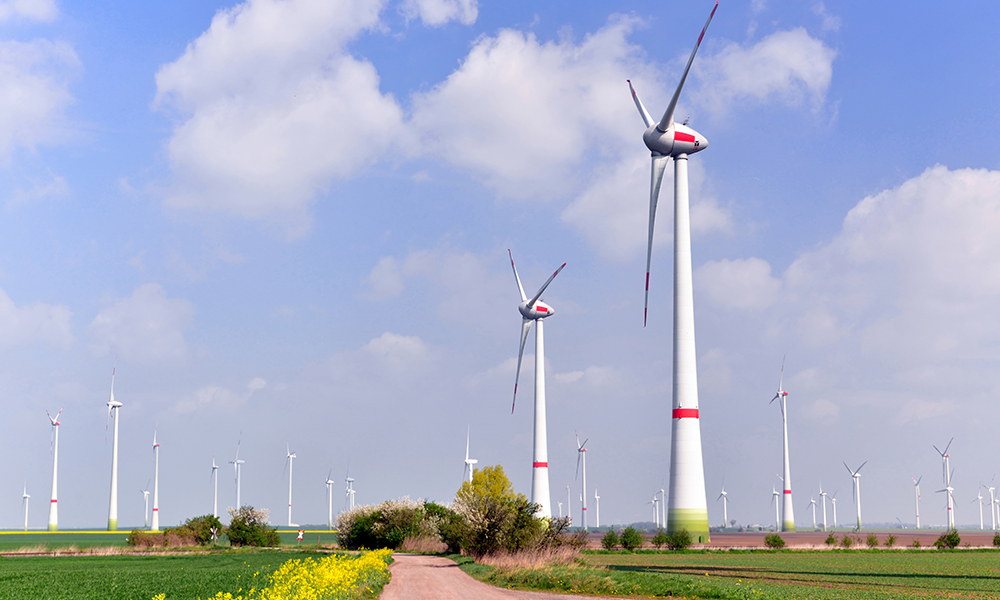
Climate change is one of the greatest challenges of our time. The earth’s temperature has already gone up 1 degree Celsius since the industrial revolution with an expected increase of .5 degrees expected to come by 2030. That .5 may not sound like a lot, but it leads to more evaporation and water vapor in the atmosphere which creates significant changes in weather conditions that put agriculture, water supplies, and people’s lives at risk.
With the approach of Earth Day, over a billion people all over the world will be focusing their attention on the issue of climate change. People, governments and companies are facing the challenge together by making changes in human behavior, policy and business practices.
SK hynix, the global top tier memory chip maker and world’s third largest semiconductor company*, is answering the call to action by embracing eco-friendly processes with a commitment to achieving 100% renewable energy by 2050. That means no usage of energy generated by fossil fuels and achieving net zero to help prevent climate change.

The Inevitability of Renewables
The benefits of renewable energy heavily outweigh those of fossil fuels. Fossil fuels such as oil, coal, and natural gas have a finite supply and at some point will be depleted. It’s not a matter of “if” but “when”. However, renewable energy sources such as sunlight, wind, rain, tides, waves, biomass, and thermal energy are derived from natural resources that replenish themselves in less than a human lifetime and are virtually inexhaustible.
The world currently relies heavily on fossil fuels which has caused irrevocable damage to the environment and human health due to climate-damaging pollution and disastrous accidents. In contrast, renewable energy sources can be used to generate electricity while emitting little to no greenhouse gases, which amounts to safe sustainable energy. Because of this, while the long term outlook for fossil fuels is bleak considering the negative impacts on health and environment, as well as its limited supply, renewables are now seen as the future of energy.
An added benefit of renewable energy is that it is localized, making it more resilient to geopolitical uncertainties. If the power supply is local, it is less likely to be effected by global unrest unlike fossil fuels which are centralized and depend on global supply chains which are vulnerable to disruption. The localized nature of renewable energy also helps create jobs and develop the economy of the community. This means the money citizens pay on their energy bill stays home to create jobs and fuel the economy.

Internalizing ESG Step by Step
The shift in management style towards ESG is changing the way boardrooms make decisions. With over USD 30 trillion being invested into ESG as of 2018, companies are taking heed of global trends that recognize the importance of non-finance based performance. This had led SK hynix to pursue what it refers to as “Double Bottom Line” (DBL), which is a management philosophy to seek economic value and social value at the same time. SK Group Chairman Chey Tae-Won explained, “A company cannot survive by only earning money, and it can create economic value by increasing social value.” Moving away from fossil fuels towards renewable energy sources will be a key success factor in reaching DBL.
One major incremental step SK hynix has taken towards 100% renewable energy for 2050 is with SV 2030, a roadmap for maximizing social values for the next decade. SK hynix plans to emit zero additional air pollutants, achieve ZWRL Gold (99%) certification, and increase water reuse up to 3 times, all by 2030, and to become net zero by 2050. Another step to accelerate ESG is the issuance of a USD 1 billion green bond for eco-friendly projects such as sustainable water quality control, energy efficiency improvement, pollution prevention, and ecological environment creation.
SK hynix has set up an ESG task force in 2020 to formulate mid-to-long term ESG management policies and reinforce execution capabilities, with the aim to internalize related management systems. In addition, they have brought in Bangsil Lee a journalist specializing in business management with expertise in the field of creating shared value, social impact, and sustainable management. She states, “I believe that the core of ESG management that SK Hynix should pursue is to use ESG as a growth momentum that can create new value by objectively diagnosing the company’s sustainability to reflect the company’s long-term strategy.”

The Path to Sustainability
Each step SK hynix has taken whether it be shifting to ESG management, maximizing social value, or creating an Eco Alliance, has been towards 100% sustainable energy. Each step in itself is composed of complex processes and decisions that require careful consideration and forward thinking, as they move beyond fossil fuels. This evolution towards sustainability is a long one, with more changes to come but SK hynix is fully committed to achieving complete reliance on renewable energy by 2050. Climate change can be averted, but it will take the cooperation of many: companies, institutions, governments and the people, working together. SK hynix is ready to do its part.
*Source – Gartner, Gartner Says Worldwide Semiconductor Revenue Grew 10.4% in 2020 – 2021, April. Results are not an endorsement of SK hynix. Any reliance on these results is at the third party’s own risk. Visit Gartner.com for more details.



